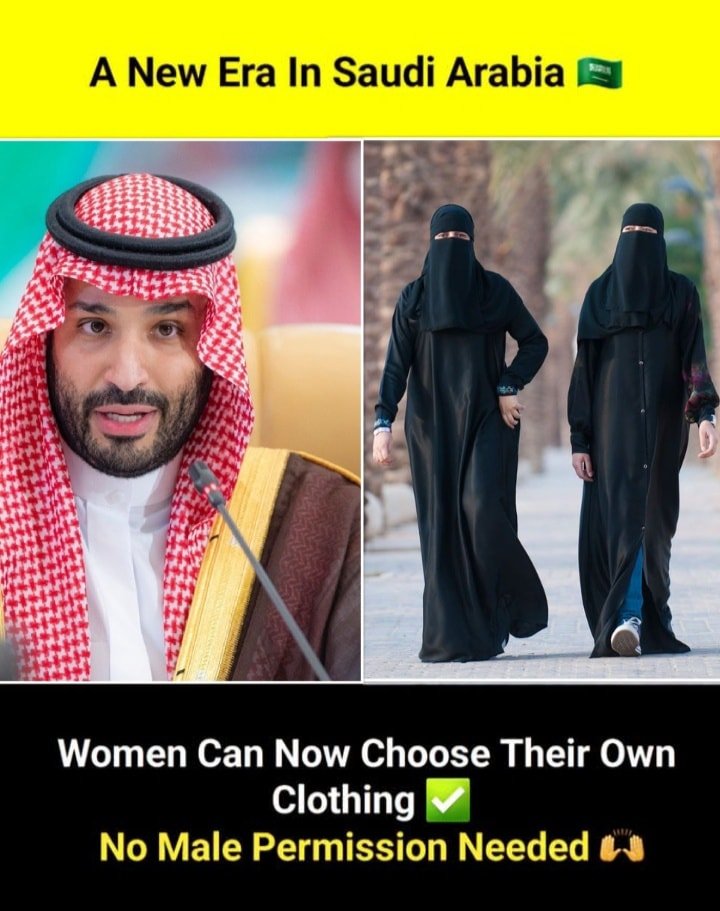A New Era in Saudi Arabia: Women’s Freedom to Choose
In a groundbreaking move, Saudi Arabia has introduced a new era of freedom for women, allowing them to choose their own clothing without needing male permission.
This significant step forward marks a major shift in the country’s conservative social norms.

Saudi arabia women can now choose their own clothing without male permission – fact or fiction?
The claim that Saudi Arabian women can now choose their clothing without male permission has sparked widespread discussion online, especially in 2025. This article examines the origins of this claim, its accuracy, recent developments, and the broader context of women’s rights in Saudi Arabia.
The Viral Claim: Saudi Women’s Clothing Freedom in 2025
In March and April 2025, social media posts, including on X, attributed a statement to Saudi Crown Prince Mohammed bin Salman (MBS) claiming, “From now on, women in Saudi Arabia will be able to decide what they wear without male permission.”
These posts, such as one by @realMaalouf on March 30, 2025, went viral, reigniting debates about women’s autonomy in Saudi Arabia. However, fact-checking reveals this claim is misleading and stems from a misquoted 2018 interview.
You have to be a fool to believe that these two cultures can coexist. pic.twitter.com/GYTu79XLqm
— Dr. Maalouf (@realMaalouf) April 9, 2025
The 2018 Interview: What Did MBS Actually Say?
The claim originates from a March 2018 CBS 60 Minutes interview with Crown Prince Mohammed bin Salman. He stated, “The laws are very clear and stipulated in the laws of Sharia: that women wear decent, respectful clothing, like men. This, however, does not particularly specify a black abaya or a black head cover. The decision is entirely left for women to decide what type of decent and respectful attire she chooses to wear.”
MBS did not mention “male permission” or explicitly state women could dress “however they want.” Instead, he emphasized that Sharia law requires “decent, respectful clothing” for both genders, and women are not mandated to wear the abaya or headscarf. This was a significant shift, as it relaxed the strict dress codes enforced by the religious police (mutawa) until the 2010s. However, the 2025 viral posts misrepresented this as a new policy granting full autonomy without male approval.
Saudi Arabia’s Dress Code in 2025: What’s Changed?
Since 2018, Saudi Arabia has implemented reforms to modernize its image under MBS’s Vision 2030. Key changes to women’s dress codes include:
- Abolition of Mandatory Abaya (2015–2019): Saudi King Salman abolished the mandatory burka in 2015, and by 2019, women could wear colorful clothing and choose styles without the black abaya. Headscarves are also no longer compulsory, though cultural norms often encourage modest dress.
- Tourist Dress Code Relaxation: In 2019, new public decency laws allowed foreign women to wear Western-style clothing, such as skirts below the knee and loose-fitting tops, though modesty is still expected. For example, women must wear an abaya when visiting mosques.
- Cultural Expectations Persist: While legal restrictions have eased, societal pressures in conservative areas can limit clothing choices. Many women opt for traditional attire to avoid judgment, as noted in X posts from April 2025.
Despite these reforms, no credible evidence from 2025 confirms a policy explicitly stating women can choose clothing “without male permission.” The male guardianship system, which requires women to seek male approval for certain decisions (e.g., travel or marriage), remains in place, though it has been partially relaxed. This system indirectly influences clothing choices in some contexts, as family or societal expectations may override legal freedoms.
Recent News and Developments in 2025
Searches for “Saudi Arabia women clothing laws 2025” and “Saudi women dress code news” reveal no new policies beyond the 2018 reforms. Fact-checking outlets like The Quint and Fact Crescendo debunked the viral claim, finding no recent statements from MBS about clothing autonomy. A keyword search for “MBS women clothing 2025” yielded no credible reports of new policies.
Reactions
However, women’s rights in Saudi Arabia remain a focal point:
- Ongoing Restrictions: The case of Manahel al-Otaibi, sentenced to 11 years in 2024 for advocating liberal dress codes and women’s rights, highlights the limits of reform. She was charged with “terrorist offenses” for online posts, including calls to end male guardianship.
- Cultural Pushback: A 2024 Financial Times report noted a tightening of dress code enforcement in some areas, suggesting a rollback of earlier liberalizations.
- International Scrutiny: Saudi Arabia’s hosting of events like the WTA Finals in 2024 drew criticism for its treatment of women, with human rights groups arguing that women are still treated as “second-class citizens.”
Why the Misinformation Spreads
The viral claim taps into global interest in Saudi Arabia’s modernization efforts and women’s rights. Misquoting MBS’s 2018 statement as a 2025 policy exaggerates the pace of reform, appealing to audiences eager for progressive news.
Social media amplification, as seen in X posts from users like @Joshua__Ubeku, fuels the spread without verification.
For SEO, targeting keywords like “Saudi women clothing freedom 2025,” “MBS women dress code,” and “Saudi Arabia women’s rights news” captures this curiosity while addressing the misinformation.
Conclusion
The claim that Saudi Arabian women can now choose their clothing without male permission in 2025 is misleading, rooted in a misquoted 2018 statement by Crown Prince Mohammed bin Salman. While dress code reforms since 2018 have granted women more legal freedom, cultural norms and the male guardianship system still limit autonomy.
No new 2025 policies support the viral claim, and cases like Manahel al-Otaibi’s underscore ongoing challenges. For those searching “Saudi Arabia women clothing news,” this article clarifies the facts and context behind this complex issue.
Sources: The Quint, Fact Crescendo, CBS News, The Guardian, Voice of America

